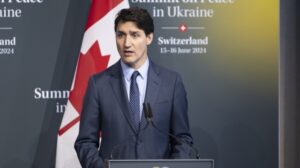Wracked by a serious political crisis, Canadian Prime Minister Justin Trudeau continues to lose supporters in his own Liberal Party, where defections are multiplying, Canadian media reported yesterday Sunday, and federal parliamentary elections are expected to be held no later than October 2025.
Mr Trudeau suffered a series of setbacks after the unexpected resignation in mid-month of his government’s deputy prime minister, against a backdrop of disagreements over how to deal with a trade war that is now taking on an increasingly clear contour as Donald Trump returns to the White House on January 20.
Trump is intent on moving to imposing a 25% tariff on products Canada exports to his country and Chrystia Freeland, who was also finance minister, slammed the door on her way out because of her disagreements with Prime Minister Trudeau on the issue.
Liberal MP Chandra Aria told Canadian public television network CBC yesterday that he and dozens of his colleagues now want the prime minister to leave as the party is now in the minority in parliament.
Canadian media reported that more than 50 of the 75 Liberal MPs from Ontario – the state of the Canadian capital, Ottawa, and Toronto – withdrew their support for Mr. Trudeau on Saturday during a meeting to consider his future.
Asked about these press reports, Mr. Aria replied that “the majority of the parliamentary caucus believes it is time for the Prime Minister to withdraw.”
“We will be in an impossible situation if he stays,” Quebec MP Anthony Housfather also opined, also speaking to CBC.
For his part, Justin Trudeau, in power for the past nine years, went ahead on Friday with a broad reshuffle of his government, changing the people who occupy about a third of his cabinet posts, without mentioning intra-party tensions.
He has, however, begun to reconsider his future, although he had announced he would run again in the federal election, which will be held no later than October.
Jagmeet Sigg, head of the New Democratic Party (NPD), once an ally of Mr Trideau, has made it clear he no longer supports the government.
Against this ominous backdrop, the Canadian prime minister, who led his party to two election victories in 2019 and 2021, is 20 points behind his Conservative rival Pierre Poilievre, based on recent polls.
For his part, Poilievre has made no secret of the fact that he wants a vote on a form proposal before the end of the year to trigger the calling of early elections, even though parliament is not expected to reconvene until January 27.
Ask me anything
Explore related questions





